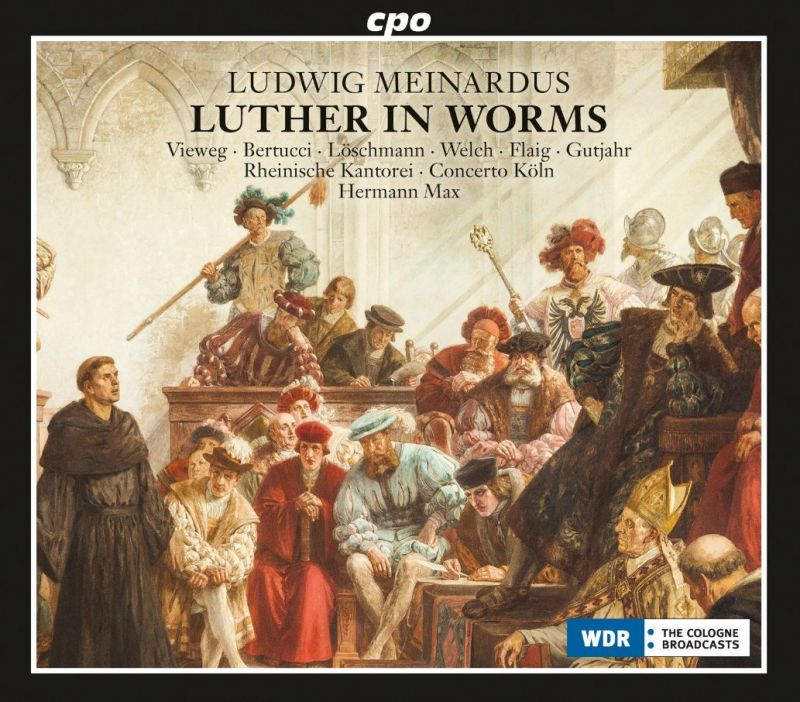MEINARDUS Luther in Worms
View record and artist detailsRecord and Artist Details
Composer or Director: Ludwig Meinardus
Genre:
Vocal
Label: CPO
Magazine Review Date: 11/2015
Media Format: CD or Download
Media Runtime: 104
Mastering:
DDD
Catalogue Number: CPO777 540-2

Tracks:
| Composition | Artist Credit |
|---|---|
| Luther in Worms |
Ludwig Meinardus, Composer
Annette Gutjahr, Marta, Alto Ansgar Eimann, Georg von Frundsberg, Bass Catalina Bertucci, Katarina, Soprano Clemens Heidrich, Ulrich von Hutten, Bass Clemens Löschmann, Justus Jonas, Tenor Concerto Köln Corby Welch, Kaiser Karl V, Tenor Hermann Max, Conductor Ludwig Meinardus, Composer Markus Fleig, Glapio; Friedrich der Weise, Bass Matthias Vieweg, Luther, Bass Rheinische Kantorei |
Author: Peter Quantrill
Much of the foregoing is drawn from the fourth volume (2012) of A History of the Oratorio, Howard E Smither’s magisterial survey in which Meinardus elicits two passing comments. This first recording of Luther in Worms deserves better than that. Its harmony may be half a century out of date, the nationalist undertow dubious to modern taste and neo-Handelian style even more so, but like its subject the piece stands up for itself. In a break from the composer’s previous treatment of Solomon (1866) and St Paul (1857), Luther in Worms works against the grain of oratorio conventions – exemplified then and now by Haydn’s Creation – which strive for epic contemplation, restrict themselves to Biblical subjects and avoid developed character-identification. Here are no anonymous arias and summatory quartets, but substantial parts for Luther (bass-baritone); his friendly nun and later wife Katherina (soprano); knightly supporters; and the Emperor Charles V (high tenor) and his henchman Glapio (bass), who pronounce heresy on Luther before everyone else sings the ‘Ein feste Burg’ chorale which has acted throughout as one of several authentically Lutheran leitmotivic threads. The would-be high-flown text does not suggest that its author, one Wilhelm Rossmann, deserves to be rescued from obscurity any more than does HA Acworth, librettist for Elgar in King Olaf and Caractacus.
Both of its parts move with clunky transitions through recitative and arioso to arrive at extended finales. Luther’s famous (if apocryphal) cry of ‘Here I stand: I cannot do otherwise’ is saved for the crucial confrontation between preacher and emperor, which Meinardus pitches between the exchanges of Christ and Pilate in the St John Passion and the banter of Sachs and Beckmesser in Die Meistersinger. Sparring choruses between Luther’s adherents and their Catholic opponents have clear Mendelssohnian echoes of the conflict between Baal and the followers of Elijah. Meinardus keeps horns and bassoons busy with orchestration on the border of original and odd, plainly developed from a study of Schumann, who had given guarded encouragement to the 19-year-old would-be composer. This is delineated strongly by this period-instrument studio recording, which otherwise does well by the piece.
All the solo and choral voices are young and keen, sometimes compensating for lack of resonance with tremulous overstatement, though I was taken with the penetrating contralto of Annette Gutjahr and the tenor Corby Welch, who declaims Luther’s sentence with persuasively imperial force. ‘Sexless opera-embryos’: thus spake Wagner of oratorios in 1849. Luther in Worms is unlikely to have changed his mind, or to lead to a flood of Meinardus recordings, but it’s a stirring curio.
Discover the world's largest classical music catalogue with Presto Music.

Gramophone Digital Club
- Digital Edition
- Digital Archive
- Reviews Database
- Full website access
From £8.75 / month
Subscribe
Gramophone Full Club
- Print Edition
- Digital Edition
- Digital Archive
- Reviews Database
- Full website access
From £11.00 / month
Subscribe
If you are a library, university or other organisation that would be interested in an institutional subscription to Gramophone please click here for further information.




